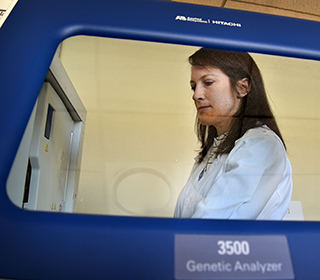Latest News Archive
Please select Category, Year, and then Month to display items
12 October 2020
|
Story Arina Engelbrecht
|
Photo Supplied
 Arina Engelbrecht from Organisational Development and Employee Well-being believes physical activity has a number of benefits for one’s health, including stress relief.
Arina Engelbrecht from Organisational Development and Employee Well-being believes physical activity has a number of benefits for one’s health, including stress relief.
Being physically active plays a big role in preventing the development of mental-health problems and in improving the quality of life of people experiencing mental-health problems.
Treatment for depression
Physical activity can be an alternative treatment for depression. It can be used as a stand-alone treatment or in combination with medication and/or psychological therapy. It promotes all kinds of changes in the brain, including neural growth, reduced inflammation, and new activity patterns are formed that promote feelings of calm and well-being. It releases endorphins – powerful chemicals in the brain that energise your spirit and make you feel good.
Physical activity can be very effective in relieving stress. Research in adults has found that physically active individuals tend to have lower stress levels compared to individuals who are less active. It also leads to improved sleep. When a person sleeps better and feels more rested, overall quality of life improves. They cope better with daily life stressors.
Reduce Alzheimer's risk
Regular physical activity can reduce your risk of developing Alzheimer's disease by up to 50%. It can also slow down further deterioration in those who have already started to develop cognitive problems. It stimulates the brain’s ability to maintain old connections as well as to make new ones.
A study asked people to rate their mood immediately after periods of physical activity (e.g. going for a walk/run, cycling, doing housework) and periods of inactivity (e.g. reading a book or watching television). Researchers found that participants felt more content, more awake, and calmer after being physically active compared to after periods of inactivity.
In conclusion, people who are physically active feel a sense of well-being, feel more energetic throughout the day, sleep better at night, have sharper memories, and feel more relaxed and positive about themselves and their lives.
“Being physically active not only changes your body, it changes your mind,
attitude, and your mood.” – Arina Engelbrecht
New Division of Virology to deliver crucial services for HIV diagnosis and resistance testing
2015-12-14

The establishment of a Division of Virology within the Department of Medical Microbiology, under the joint auspices of the UFS and the National Health Laboratory Service (NHLS), reflects the continued growth within Virology. Dr Dominique Goedhals, Head of the Division, says the division will also provide training of undergraduate medical students, medical technologists and technicians, and registrars. |
The newly established Division of Virology at the University of the Free State will be one of only five laboratories in the country to be involved in crucial diagnostic and testing services for HIV viral load monitoring, early infant diagnosis, and HIV resistance testing.
The Virology Diagnostic Laboratory serves as the reference laboratory for all HIV National Priority Programme samples for the Free State and Northern Cape provinces.
Medical staff at the laboratory will provide a 24-hour consultative service, as well as outreach programmes to district laboratories in the Free State and Northern Cape where pathologists are not available.
Dr Dominique Goedhals, Head of the Division of Virology, says this division, under the joint auspices of the UFS and the National Health Laboratory Service (NHLS), reflects the continued growth within Virology.
The division will not only deliver this critical diagnostic service, but will also focus on training and teaching, as well as research.
Teaching and training activities include teaching of undergraduate medical students, medical technologists and technicians, and registrars. The postgraduate science programme has a high output of honours, master’s and doctoral students in Virology. The intern medical scientist programme is also active, with five interns having successfully submitted their portfolios since the programme was implemented in 2010.
Research activities under the Head of Research, Prof Felicity Burt, have also expanded and continue to show increases in publication output and acquisition of grant funding. Established research groups within the Division of Virology focus on vector-borne and zoonotic viruses, human papilloma viruses (HPV), and human immunodeficiency virus (HIV), as well as work with a number of international collaborators.